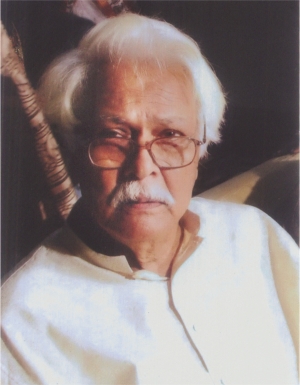| Home - Back Issues - The Team - Contact Us |
 |
| Volume 10 |Issue 44 | November 25, 2011 | |
|
|
Tribute IMDAD HOSSAIN SYED BADRUL AHSAN When certain individuals die, it is a phase in history that goes with them. When Imdad Hossain passed into the great beyond close to a fortnight ago, it was something of this nation's long tale of struggle that he took with him. And Imdad Hossain had something else going for him, that sure touch of poetry we call art, which added substance to his life. He observed the varied phases of existence and put them all into his imagination before he committed them to the canvas. Art, he believed as much, was life. Or life was art. Whichever way you look at it, experience is always a full-blown affair and because it is, it goes into giving human nature a roundness that often lifts literature to some necessary heights.
From that perspective, Imdad Hossain was a round character. Not for him the satisfaction of life lived in a flat, nondescript mould. He brought passion into his work, into the thoughts which informed him that life had to be lived on the peaks or not at all. And he was well equipped to shape that sort of life for himself. When in 1950 the old, terrifying spectre of communal riots unleashed itself in East Bengal, newly made part of the equally new state of Pakistan, Hossain entertained little thought of his own safety. He demonstrated nothing in his behaviour that could be seen as indifference to the plight of the hapless Hindus. His faith did not come in the way of his humanity. Raising a group of volunteers, he made sure that on his watch, on the watch of his friends, no harm came to the Hindu community. Partition might have become a tragic reality, but that had nothing to do with the heritage of a people, in this instance Hindus and Muslims. In 1950, it was cultural heritage Imdad Hossain sought boldly to uphold. Not many were around to emulate him. Those who were did not need to be told why men like Imdad Hossain needed to be around. Longevity gave Imdad Hossain a clearer view of the world he was part of. His artistic images, so representative of his thoughts, meshed in easily with his brand of politics. He was never a political activist, in that involved sense of the meaning. But he was smart enough to know that societal progress could only be ensured by those who comprehended the realities on the ground. And who better than the Left to do that? Imdad Hossain was not a communist, not in that overt way. But that he believed in socialistic principles, something which all good men did and still do, was as clear as the summer sky. Waheedul Haque was his friend, which says a whole lot about the causes Imdad Hossain believed in. It was at his home that leftist politicians, persecuted by the Pakistani regime, met day after day to shape strategy. Any other individual might or would have stayed away from such provocation to trouble. Imdad Hossain was not any other individual. He was part of the stream of consciousness which consistently carried the country along with it. In the build-up to the Language Movement of 1952, the young artist energetically went into preparing posters that spoke to the nation of what it needed to do save its heritage. And that was the role he played as part of the Sharbadaliya Rashtro Bhasha Sangram Parishad. It was an age of idealism resting on radical zeal. It was a precursor to the inevitable revolution that was to come a mere nineteen years down the line. As Imdad Hossain pursued that necessary trail we know is the search for a livelihood (and he did that in 1953 through turning himself into a commercial artist, designing book covers and the like), he did not let thoughts of the country, of its future, run away from him. It was another year, 1969, which only hardened his hold on his beliefs. With Potua Quamrul Hasan, he forged the Charushilpi Shangstha. It was a case of one stream mingling with another, the streams reinventing themselves as a river and then so many rivers coming together before losing themselves into the sea. The sea destroyed the Ayub Khan military regime in March 1969. Imdad Hossain's part in that drama was never forgotten by those who watched the energy bubble in him before it burst, happily, into a thousand crackers, all of which went into inaugurating a new dawn for a nation steeped in tradition. This nation is diminished by Imdad Hossain's passing. And yet the national soul, always alive, always throbbing, will ceaselessly pulsate with the dreams that he and so many others forged continually over long stretches of time, all the way up to the liberation of this land. He was a hero of his times. In these times of receding heroism, he and his era remain our shining symbols of historicity. The writer is Executive Editor, The Daily Star.
Copyright (R) thedailystar.net 2011 |
